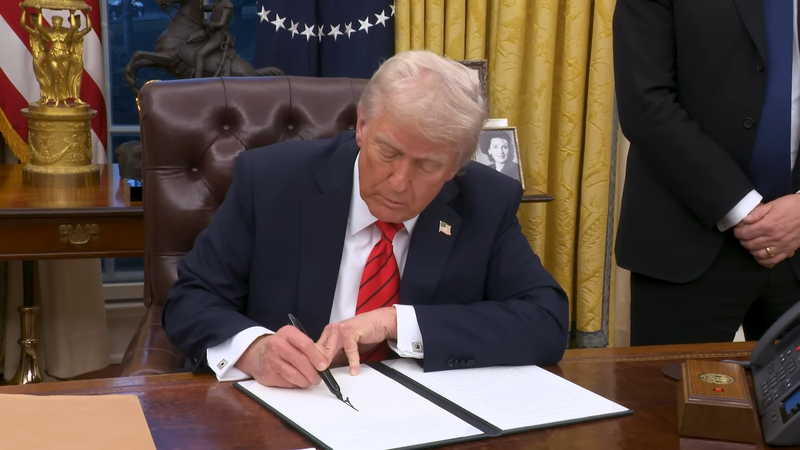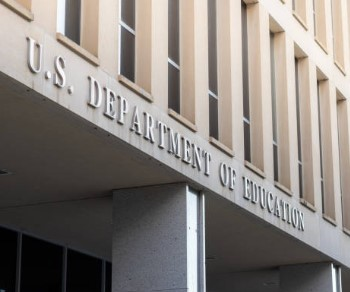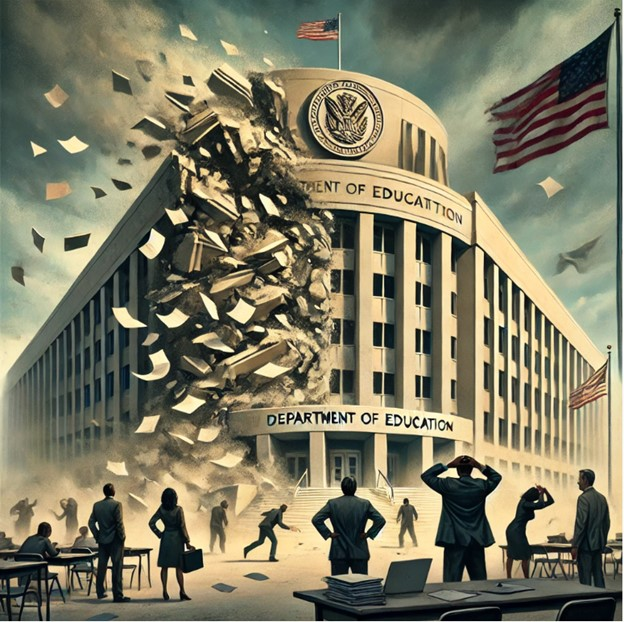Dismantling the Department of Education: Trump’s Executive Order and the Future of American Schooling
Input
Modified
A Long-Standing Conservative Dream Becomes Executive Action Disruption and Disparity: The Consequences of Federal Withdrawal A Nation Divided: The Battle Over Educational Control

A Long-Standing Conservative Dream Becomes Executive Action
The dismantling of the U.S. Department of Education was initiated by an executive order signed by former President Donald Trump on March 20, 2025. This unprecedented action represents a critical juncture in American educational policy, sparking a ferocious national discourse regarding the federal government's involvement in education. The transition of educational authority back to individual states, as directed by Trump's executive order, is consistent with a long-standing conservative objective to reduce federal supervision and strengthen local control. However, the order has not only energized supporters who advocate for decentralization, but it has also alarmed educators, civil rights advocates, and political opponents who warn of the dire consequences for students, particularly the most vulnerable.
Trump's executive order establishes a strategy for the gradual dissolution of the Department of Education. The department is to be closed in a manner that guarantees "continuity of service" during the transition, and Secretary of Education Linda McMahon is instructed to "take all necessary steps." The order also prohibits the use of remaining federal funds to support diversity, equity, and inclusion (DEI) programs, or what it refers to as "gender ideology," as reported by Politico and Fox News. This action is consistent with broader conservative critiques of progressive curricula and administrative priorities in public schools.
The notion of eliminating the department has been proposed previously. Conservative legislators have opposed the Department of Education since its inception in 1979 under President Jimmy Carter, as they perceive it as an illustration of federal overreach. During his 2016 and 2024 presidential campaigns, Trump himself advocated for the concept, and this executive order fulfills his pledge to restrict the federal government's involvement in education.
The political strategy that underpinned the move was underscored by a symbolic signing ceremony. Republican governors, including Greg Abbott (Texas), Ron DeSantis (Florida), Mike Braun (Indiana), and Mike DeWine (Ohio), as well as conservative advocacy groups like Moms for Liberty, The Heritage Foundation, and Concerned Women for America, flanked Trump. The presence of these key figures served as a sign of unity within the conservative spectrum, with the objective of inspiring the Republican constituency in anticipation of the 2026 midterm elections.
Nevertheless, the dissolution of a federal department necessitates more than an executive order. The Department of Education must be abolished by Congress, a procedure that would necessitate 60 Senate votes—a threshold that is currently unattainable due to Democratic opposition. Consequently, the order is a potent political statement and operational starting point; however, it is unable to completely realize its objectives in the absence of legislative support.

Disruption and Disparity: The Consequences of Federal Withdrawal
The administration has already implemented extensive measures to undermine the department's operational capabilities, despite the legal uncertainty surrounding full abolition. The Department of Education has terminated approximately 1,300 employees, which accounts for nearly half of its workforce, as reported by CNN and The Guardian. These terminations encompass personnel from critical sectors, including the Office for Civil Rights, federal student assistance services, and legal divisions. The extent of these reductions generates significant concerns regarding the federal government's capacity to continue offering essential services.
One immediate concern is the disruption in the administration of federal student loans. Federal financial aid programs are essential for the attendance of college by millions of students nationwide. A function that necessitates substantial infrastructure and personnel is the management of nearly $1.6 trillion in student loans by the Department of Education. With the elimination of hundreds of positions, there is concern among experts regarding the potential for increased delays in loan processing, reduced borrower support, and breaches in servicing oversight.
The implications for pupils who are disadvantaged are equally alarming. The department is responsible for the federal administration and funding of critical programs, including the Individuals with Disabilities Education Act (IDEA), Title I (support for low-income schools), and English Language Acquisition grants. Gaps in service could potentially widen, particularly in under-resourced communities that already grapple with educational equity, in the absence of a federal entity to coordinate, distribute, and enforce these programs.
Critics contend that the Department of Education's dissolution could undo decades of progress in the enforcement of civil rights in schools. The Office for Civil Rights is essential in the investigation of discrimination based on sexual orientation, gender, disability, and ethnicity. The partial deactivation of this system raises concerns regarding the erosion of protections for marginalized pupils.
"Returning power to the states may appear appealing until one considers that not all states will prioritize equity," stated a former department employee who spoke to BBC News on the condition of his anonymity. "While the department was not flawless, it served as a safety net for children who were at risk." That has since vanished.

A Nation Divided: The Battle Over Educational Control
Conservative intellectuals and grassroots organizations have praised Trump's action as a "common sense" approach to government reform. Advocates contend that the Department of Education has evolved into a large bureaucracy that stifles innovation and imposes uniform regulations on diverse local communities. They are of the opinion that the return of control to state and local authorities will result in education systems that are more responsive, efficient, and customized.
Tiffany Justice, co-founder of Moms for Liberty, declared during the signing ceremony that the federal government has no business dictating to parents how to educate their children. "This pertains to the restoration of local accountability and parental rights."
The Heritage Foundation and other organizations have also praised the move, deeming it a crucial step in the process of deconstructing what they perceive as federal overreach into areas that should be constitutionally reserved for states.
However, there has been a rapid and vocal backlash. Congressional Democrats, civil rights organizations, teacher unions, and numerous education experts have expressed concern that Trump's proposal could have an irreparable impact on public education. Senator Patty Murray (D-WA), Chair of the Senate Education Committee, referred to the order as "reckless and deeply harmful" during a press conference. She further stated, "This is not about efficiency; it is about erasing protections and opportunities for students nationally."
The ideological divide is indicative of more profound national tensions regarding the purpose of education. Education has become a battleground for cultural issues such as gender identity, critical race theory, and parental rights for many conservatives. In the interim, progressives contend that federal supervision is essential to guarantee consistent quality and fairness across 50 distinct state systems.
Some policy analysts contend that Trump's action may have a limited direct legal impact in the short term, but it may have significant symbolic power in the long term. "Even if Congress does not abolish the department, the delegitimization of federal education policy is being observed," stated Dr. Erica Dawson, a professor of public policy at the University of Michigan. "That will alter the political landscape for years to come."
In this regard, the order is more than a mere policy modification; it is a cultural indicator of the future of education in the United States. It poses fundamental questions: Who is responsible for determining what students learn? What is the most effective method for allocating public funds? What is the federal government's responsibility in ensuring equal opportunity?
One of the most radical proposals in recent U.S. educational history is the executive order to dismantle the Department of Education. Although it may ultimately fail to abolish the department entirely due to the constitutional requirement for congressional sanction, it nevertheless conveys a powerful message regarding the trajectory of federal policy under Trump's influence.
Mass unemployment, service disruptions, and a redistribution of responsibilities to the states are already being experienced as immediate consequences. In the long term, the action has the potential to alter the expectations of the federal government regarding its obligations to students, families, and institutions, particularly those in underserved or vulnerable communities.
The dismantling is perceived by supporters as a long-overdue correction that will re-empower states and parents. Detractors regard it as a perilous abdication of responsibility that has the potential to exacerbate inequality and undermine national unity. One thing is certain: U.S. education policy is at a juncture, and the result will have a lasting impact on the nation for decades to come as the debate transpires in Congress, courts, and communities.





















